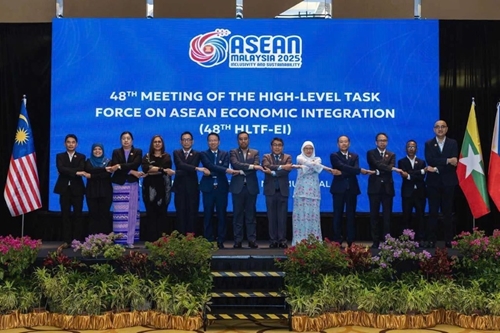The two-day event brought together representatives from member states of the Association of Southeast Asian Nations (ASEAN), the ASEAN Secretariat, and Timor-Leste, which participated as an observer.
According to the Ministry of Industry and Trade’s Multilateral Trade Policy Department, the meeting focused on recent global and regional economic developments, including updates from the ASEAN Geoeconomics Task Force's meetings.
    |
 |
|
A view of the event (Photo: MoIT) |
Delegates reviewed the implementation of Malaysia’s 2025 Priority Economic Deliverables (PEDs), progress in performing the ASEAN Economic Community (AEC) 2025 Blueprint, and outcomes of the 15th Meeting of the Working Group for the AEC Strategic Plan Post-2025.
Proposals to streamline the AEC’s meeting schedule, assessments of non-tariff barriers (NTBs) within the region, future strategies to address them, and potential cooperation with the Asian Development Bank (ADB) were also touched upon.
On the sidelines of the event, ASEAN member states exchanged views with a representative from the U.K.’s Foreign, Commonwealth and Development Office on recent regional and global developments and their implications for ASEAN. Delegates also reviewed a study by the Economic Research Institute for ASEAN and East Asia (ERIA) on the proposed ASEAN Framework for Integrated Semiconductor Supply Chains (AFISS).
At the meeting, ASEAN countries noted a regional economic growth rate of 4.8% in 2024, with a projected rate of 4.2% for 2025. Total goods trade reached 3.8 trillion USD, with intra-ASEAN trade accounting for the largest share at 21.4%, followed by trade with China (20.1%), the U.S. (11.8%), and the E.U. (7.6%).
The ASEAN member states reaffirmed the bloc’s central role in regional economic and trade cooperation, acknowledged progress in economic integration, and discussed future directions for deepening intra-regional trade and investment.
Vietnam acknowledged the meeting’s assessments of current global and regional economic conditions and reiterated its commitment to a rules-based multilateral trading system, with the World Trade Organization at its core.
In light of ongoing challenges, Vietnam emphasized the need for ASEAN to strengthen its regional position and resilience through deeper economic integration and enhanced relations with external partners. This includes maximizing the benefits of existing agreements such as the ASEAN Trade in Goods Agreement (ATIGA) and the Regional Comprehensive Economic Partnership (RCEP); pursuing initiatives like an ASEAN–CPTPP dialogue; expanding partnerships with new actors; and building capacity in emerging areas such as digital transformation, green transition, and the semiconductor industry.
Vietnam also expressed its support for Malaysia’s 2025 economic cooperation priorities under its ASEAN Chairmanship and pledged continued collaboration to achieve the set goals, contributing to the overall success of ASEAN Year 2025. The country also announced plans to host the 16th Meeting of the Working Group for AEC Strategic Plan Post-2025 in Hoi An of Da Nang city.
On the sidelines of the event, the Vietnamese delegation held a bilateral meeting with its Philippine counterpart, led by Assistant Secretary of the Department of Trade and Industry Allan B. Gepty. Both sides reviewed progress in bilateral trade and industrial cooperation and discussed initiatives to further strengthen the partnership.
Source: VNA